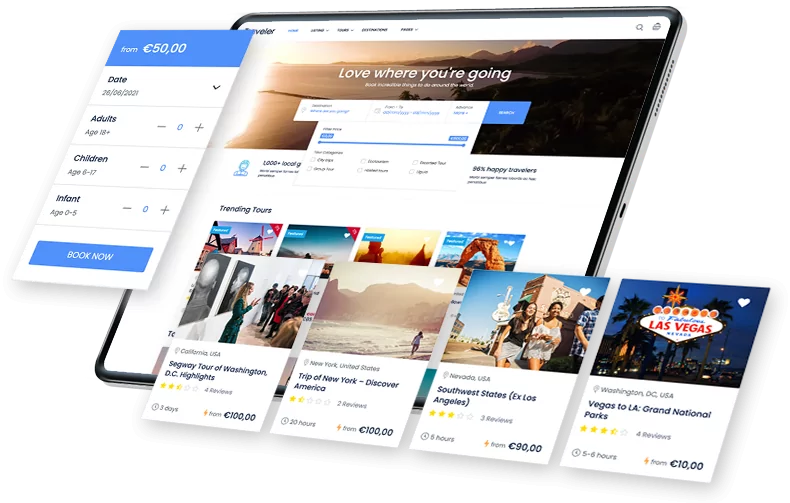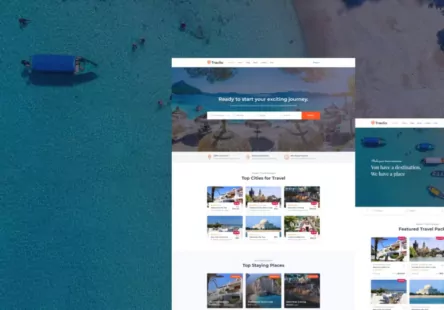Tabla de contenido
[zoomsounds id=”seo-for-hotels-simple-tips-to-ensure-top-serp-rankings”]
Online hotel businesses and travel websites must pull all the stops to maintain traffic. SEO for hotels can be a tricky issue, given how often search engines update algorithms and guidelines. But with the right approach, hotel owners can help their websites occupy the most coveted positions on search engine results pages (SERPs).
Web design, keyword research, and local SEO are among the major focuses in improving online presence as an enterprise. Business owners can enjoy ideal results if they know what to do. If they don’t, they can hire web experts for assistance. Either way, it is important to understand a few key things. To do that, there’s a need to make one thing absolutely clear.
Without SEO, Your Business is Dead on Arrival
Having an online presence is undeniably has its important for attracting a greater target audience. But as more businesses join the internet, the market is becoming increasingly crowded. In this highly competitive realm, winning the favor of search engines is critical for keeping up with the competition.
While SEO for hotels and other businesses can concentrate on all major search engines, one of them deserves the most attention. Google is the most used web client for the vast majority of searches, including people looking for hotels or apartments to stay in.
Organic searches, in particular, provide the most promising results for users. To maximize their prospects, businesses must think and act clearly and carefully, but also creatively. For your hotel website to appear on the first page, you need quality content, ease of use, and a little marketing savvy as well.
Effective Website Design
Designing a user-friendly front end and optimum page experience is a necessary part of SEO for hotels. Good-looking WordPress sites attract more viewers. This leads to popularity among prospective customers.
But from an SEO perspective, you need to retain viewers as well. For digital businesses and store websites, visitors need to be “converted” to bookers, buyers, or at least frequent website visitors that might avail your business or recommend it to their friends.
As these conversions multiply, the website experiences more traffic, which in turn makes it worth Google’s time. Search engines use crawling software to determine a website’s suitability for indexing.
Sites that prioritize visitor experience and convenience enjoy more organic conversions and, as a result, better rankings. There are many ways to go about this approach to SEO. For hotels, we’ll discuss a few important things.
1. User-Friendly Layout
The content and design on your website need to be as inviting as the entrance and reception of an actual hotel. But choosing an attractive theme is just one aspect of getting results. Your customers must receive an experience worth staying for and returning, again, much like the real thing.
Quality content looks great but should not hamper the user’s navigation. For instance, the combination of fonts and backgrounds should be stylish but also contrasting and easy on the eye. Use negative space, menus, animated content, and other facilities on your main homepage.

2. Meaningful Content
For people trying to book in a hurry, the option to book and pay for a room should be quick. But rather than throw in a large, prominent booking button on every page, you need to be more strategic. For one thing, you must help customers make informed decisions about their stay.
Plus, not everyone wants to book right away when simply visiting a hotel site. If you simply place a big, bright button in the middle of the page saying “BOOK NOW!” in all caps as if shouting, visitors might feel pressured and not stay for long.
Instead, focus on other calls to action and allow them to explore your site, services, galleries, and social media stories. That way, even without gaining clients, you earn traffic for better SEO prospects.
Your content should cater to all types of potential customers. Some people like reading lengthy blogs. Others prefer more straightforward things like perusing room options, pricing, and FAQ pages. All these facilities are signs of a visibly competent online business, and Google tends to favor those.
Optimizing Written Content
Regarding SEO for hotel sites or any web-based service, this is particularly key. Dividing written content into subsections makes it easier to consume. And giving each morsel of text a delightfully catchy heading makes it more appealing. But that’s not all.
Google and other search engines tend to update SEO guidelines from time to time. But a common practice that they tend to reward is the “H1, H2, H3…” tagging format for headlines, meta tags, and most other forms of written content. This method helps your web pages use space more effectively and arrange content in a structured manner.
Optimizing Visual Content
The use of professional photography, animated content, and videos of your services is effective for marketing. But for SEO for hotels, you’ll need to adjust these files for the best results.
In the case of image files, heavier formats like JPEG or PNG should either undergo size compression or replacement with lighter formats like WEBP. This is primarily to help with website performance and speed (which we’ll get to in a moment).
Another key step is to supplement each image with alt text or tags. This gives crawlers like Googlebot additional information to properly index websites and their content for the best results on SERPs.
3. Improving Website Speed
People using the web for online shopping and reservations tend to be impatient, which is bad for slow websites. Web pages that take longer to load lose visitors as a result. What does that have to do with SEO for hotels, you ask?
Web crawlers don’t just analyze your site content but also analytics. If your site is slow, the resulting slope in visits and conversions over time won’t go unnoticed. To avoid getting ignored by Googlebot, but also to improve user impressions, to maintain your website’s performance is important.
We’ve touched upon how to optimize visual media to achieve that. But there’s a lot more that you have to look into, including
- Using a lighter theme
- Getting rid of unnecessary plugins and software
- Adjust hosting preferences
- Compress code management
- Mobile-first design (more on that later)
Keeping your website running like a well-oiled machine is a continuous process. But upgrading site loading speed represents just one facet of that particular coin. The other side concerns another major step…
4. Routine Site Maintenance
Search engines don’t just disapprove of slow websites but also those that are not regularly updated. This makes sense because if your site is full of outdated content, dead links, and error pages, it negatively impacts the user experience. That leads to reduced traffic, which in turn affects SEO prospects for hotels.
As with slow speed, poor maintenance becomes obvious to crawlers through website statistics and is not a good look. Hence, your website needs regular updates if you are to fare well here.

Five-Star Hotel Website
Do you need a redesign or a new website for your hotel?
A complete solution for the digitalization of hotels. Great UX/UI designers, experienced programmers and high emphasis on testing. If you are looking for a professional partner for your online presence, we are here for you. With direct sales we help you to reduce your booking costs!
5. Prioritize Mobile Users
If you’re running a hotel website, chances are that more people are using their phones to visit it over Desktop. While that is the case everywhere, this particular situation isn’t that much of a surprise. Who needs to whip up a laptop to reserve a hotel room in this day and age?
But despite that, the majority of online pages are not mobile-optimized. That means the same website offers a less convenient experience on an Android or iPhone screen than it does on a computer. Given what we’ve discussed, this can discourage phone users who should make up the bulk of an online hotel’s audience.

But in terms of SEO for hotels, user experience alone does not affect Google’s impressions of your site. The fact is that, since the mid-to-late 2010s, Googlebot has been actively prioritizing mobile-first sites for indexing, given the fact that they value their users.
Consequently, taking steps to make your online hotel business more phone friendly alone is excellent for gaining organic search engine gains. These steps don’t just include adjusting page content based on screen size but also the lower power capacity and bandwidth available to mobile devices.
Using Keywords
In the arena of SEO, for hotel websites or any other business, keywords are perhaps your most potent weapon. When used correctly, you can leave competitors in the dust. But keyword research is not as straightforward as it seems.
For a start, avoid popular keywords. If you invest in words or phrases that are already overused, locating your business will be like finding a needle in an already saturated haystack. You need to employ keywords that are fresh, less exposed in the market, but have great market value depending on who you’re targeting.
For hotel services, specific combinations of terms are more likely to draw better impressions through search results. Prioritize key phrases based on locality (e.g., holiday hotels in Mauritius), seasonal service (best hotels for summer), specific facilities (hotels with swimming pools), and other laser-focused yet marketable factors.
Once you’ve come across a keyword, capitalize on it as much as you can. Incorporate it and variations into your page headings, meta information, alt tags, ads, off-page marketing, basically everywhere.
Finding the right keywords is a balancing act where you might not succeed at first. But once you get the hang of it, your SEO game is largely set. Just make sure to avoid keyword stuffing in your content.
Off-Page SEO
In digital marketing, experts generally treat SEO as one of two major categories (if we exclude the technical stuff). Everything we’ve discussed up to this point falls under on-page SEO. In a literal sense, it includes everything you need to do within the confines of your website to make it more search-friendly.
But the internet is a vast ocean of content, and your website cannot afford to be an island. To direct your would-be customers to it, your best bet is to do so through other websites. This falls under off-page SEO. For hotel owners, in particular, the following steps can help here.
1. Link-Building
In off-page SEO, this is very much the main event. To improve your position as an enterprise worth seeking, you need to distribute links to your website to other web pages. But this step isn’t as simple as just that. You need to be tactical and calculated in your approach.

First and foremost, only select quality links to your webpage. By sending your best, you can assure others that what you’re offering is worth their time. Secondly, choose reputable websites to feature your links. Building links through recognized platforms is the way to go if you’re serious about SEO for hotels.
Having other websites sponsor links to your web pages is known as internal linking. Additionally, with external linking, you can indirectly promote your service through other sites that feature relevant content. The more links you build, the better off you will be.
2. Local Listings are Key
In the particular case of SEO for hotels, local SEO is an unavoidable part of the marketing checklist. For that, you need a widely available and universally consistent UNAP (URL, name, address, and phone number). This allows your contact information to be readily available to your client base.
Online businesses can take advantage of this through web platforms like Google My Business. Registering your hotel here makes tracking through Maps and other popular apps or resources easier. Along with the basic credentials, you can also feature promotional images, details about facilities, social media links, good reviews, and ratings to improve your standing on SERPs.
3. Social Media
Social networking is not the most relevant aspect of off-page SEO. For hotel businesses, however, the opportunities are still there. It’s no secret that social media campaigns are an important ingredient in crafting an impactful online presence for hotels.
Not only that, but popular services and enterprises often receive top billing on the very top of many SERPs, along with tantalizing glimpses of their online profiles. This is another way to guarantee the attention and conversion of likely consumers when they need a booking.
Seek Professional Assistance for Your SEO Needs
At its core, SEO is not a complicated subject. However, if you’re running a digital store or service provider, time is money. And the more of it you spend on perfecting your own SEO skills, the less of it you have to manage your own bread and butter.
Digital e-commerce services such as WeLoveWeb are constantly providing solutions to problems such as this. This includes web design and content management for hotels as well. For a small price, you can put your trust in these services as they help you build your WordPress-based business.
In Conclusion
Having your online service attain desirable search engine rankings isn’t the easiest undertaking. But with the right aid and the knowledge that you’ve now gained, investing in SEO for hotels can pay dividends in returns.







